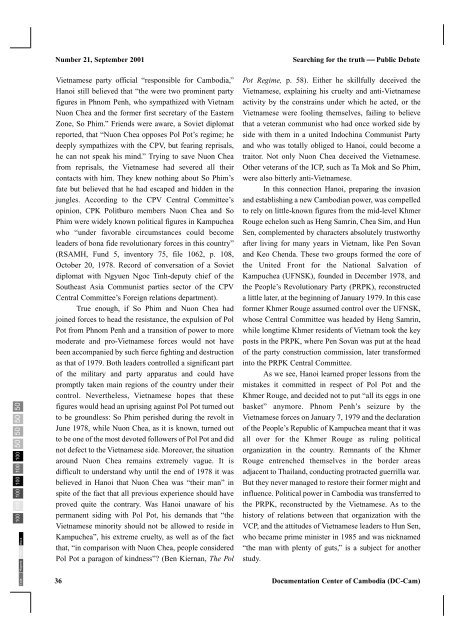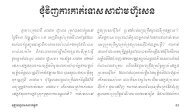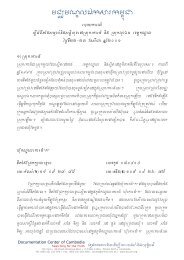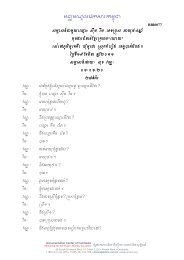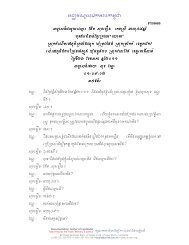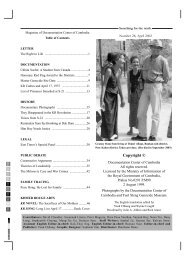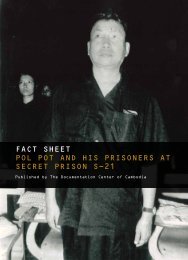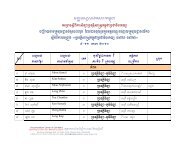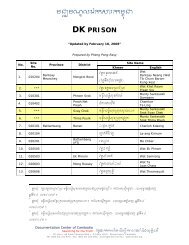Searching for the truth Issues 21 - Documentation Center of Cambodia
Searching for the truth Issues 21 - Documentation Center of Cambodia
Searching for the truth Issues 21 - Documentation Center of Cambodia
You also want an ePaper? Increase the reach of your titles
YUMPU automatically turns print PDFs into web optimized ePapers that Google loves.
100 100 100 100 100 100 50 50 50 50<br />
Black<br />
Yellow<br />
Magenta<br />
Cyan<br />
Number <strong>21</strong>, September 2001<br />
Vietnamese party <strong>of</strong>ficial “responsible <strong>for</strong> <strong>Cambodia</strong>,”<br />
Hanoi still believed that “<strong>the</strong> were two prominent party<br />
figures in Phnom Penh, who sympathized with Vietnam<br />
Nuon Chea and <strong>the</strong> <strong>for</strong>mer first secretary <strong>of</strong> <strong>the</strong> Eastern<br />
Zone, So Phim.” Friends were aware, a Soviet diplomat<br />
reported, that “Nuon Chea opposes Pol Pot’s regime; he<br />
deeply sympathizes with <strong>the</strong> CPV, but fearing reprisals,<br />
he can not speak his mind.” Trying to save Nuon Chea<br />
from reprisals, <strong>the</strong> Vietnamese had severed all <strong>the</strong>ir<br />
contacts with him. They knew nothing about So Phim’s<br />
fate but believed that he had escaped and hidden in <strong>the</strong><br />
jungles. According to <strong>the</strong> CPV Central Committee’s<br />
opinion, CPK Politburo members Nuon Chea and So<br />
Phim were widely known political figures in Kampuchea<br />
who “under favorable circumstances could become<br />
leaders <strong>of</strong> bona fide revolutionary <strong>for</strong>ces in this country”<br />
(RSAMH, Fund 5, inventory 75, file 1062, p. 108,<br />
October 20, 1978. Record <strong>of</strong> conversation <strong>of</strong> a Soviet<br />
diplomat with Ngyuen Ngoc Tinh-deputy chief <strong>of</strong> <strong>the</strong><br />
Sou<strong>the</strong>ast Asia Communist parties sector <strong>of</strong> <strong>the</strong> CPV<br />
Central Committee’s Foreign relations department).<br />
True enough, if So Phim and Nuon Chea had<br />
joined <strong>for</strong>ces to head <strong>the</strong> resistance, <strong>the</strong> expulsion <strong>of</strong> Pol<br />
Pot from Phnom Penh and a transition <strong>of</strong> power to more<br />
moderate and pro-Vietnamese <strong>for</strong>ces would not have<br />
been accompanied by such fierce fighting and destruction<br />
as that <strong>of</strong> 1979. Both leaders controlled a significant part<br />
<strong>of</strong> <strong>the</strong> military and party apparatus and could have<br />
promptly taken main regions <strong>of</strong> <strong>the</strong> country under <strong>the</strong>ir<br />
control. Never<strong>the</strong>less, Vietnamese hopes that <strong>the</strong>se<br />
figures would head an uprising against Pol Pot turned out<br />
to be groundless: So Phim perished during <strong>the</strong> revolt in<br />
June 1978, while Nuon Chea, as it is known, turned out<br />
to be one <strong>of</strong> <strong>the</strong> most devoted followers <strong>of</strong> Pol Pot and did<br />
not defect to <strong>the</strong> Vietnamese side. Moreover, <strong>the</strong> situation<br />
around Nuon Chea remains extremely vague. It is<br />
difficult to understand why until <strong>the</strong> end <strong>of</strong> 1978 it was<br />
believed in Hanoi that Nuon Chea was “<strong>the</strong>ir man” in<br />
spite <strong>of</strong> <strong>the</strong> fact that all previous experience should have<br />
proved quite <strong>the</strong> contrary. Was Hanoi unaware <strong>of</strong> his<br />
permanent siding with Pol Pot, his demands that “<strong>the</strong><br />
Vietnamese minority should not be allowed to reside in<br />
Kampuchea”, his extreme cruelty, as well as <strong>of</strong> <strong>the</strong> fact<br />
that, “in comparison with Nuon Chea, people considered<br />
Pol Pot a paragon <strong>of</strong> kindness”? (Ben Kiernan, The Pol<br />
36<br />
<strong>Searching</strong> <strong>for</strong> <strong>the</strong> <strong>truth</strong> ⎯ Public Debate<br />
Pot Regime, p. 58). Ei<strong>the</strong>r he skillfully deceived <strong>the</strong><br />
Vietnamese, explaining his cruelty and anti-Vietnamese<br />
activity by <strong>the</strong> constrains under which he acted, or <strong>the</strong><br />
Vietnamese were fooling <strong>the</strong>mselves, failing to believe<br />
that a veteran communist who had once worked side by<br />
side with <strong>the</strong>m in a united Indochina Communist Party<br />
and who was totally obliged to Hanoi, could become a<br />
traitor. Not only Nuon Chea deceived <strong>the</strong> Vietnamese.<br />
O<strong>the</strong>r veterans <strong>of</strong> <strong>the</strong> ICP, such as Ta Mok and So Phim,<br />
were also bitterly anti-Vietnamese.<br />
In this connection Hanoi, preparing <strong>the</strong> invasion<br />
and establishing a new <strong>Cambodia</strong>n power, was compelled<br />
to rely on little-known figures from <strong>the</strong> mid-level Khmer<br />
Rouge echelon such as Heng Samrin, Chea Sim, and Hun<br />
Sen, complemented by characters absolutely trustworthy<br />
after living <strong>for</strong> many years in Vietnam, like Pen Sovan<br />
and Keo Chenda. These two groups <strong>for</strong>med <strong>the</strong> core <strong>of</strong><br />
<strong>the</strong> United Front <strong>for</strong> <strong>the</strong> National Salvation <strong>of</strong><br />
Kampuchea (UFNSK), founded in December 1978, and<br />
<strong>the</strong> People’s Revolutionary Party (PRPK), reconstructed<br />
a little later, at <strong>the</strong> beginning <strong>of</strong> January 1979. In this case<br />
<strong>for</strong>mer Khmer Rouge assumed control over <strong>the</strong> UFNSK,<br />
whose Central Committee was headed by Heng Samrin,<br />
while longtime Khmer residents <strong>of</strong> Vietnam took <strong>the</strong> key<br />
posts in <strong>the</strong> PRPK, where Pen Sovan was put at <strong>the</strong> head<br />
<strong>of</strong> <strong>the</strong> party construction commission, later trans<strong>for</strong>med<br />
into <strong>the</strong> PRPK Central Committee.<br />
As we see, Hanoi learned proper lessons from <strong>the</strong><br />
mistakes it committed in respect <strong>of</strong> Pol Pot and <strong>the</strong><br />
Khmer Rouge, and decided not to put “all its eggs in one<br />
basket” anymore. Phnom Penh’s seizure by <strong>the</strong><br />
Vietnamese <strong>for</strong>ces on January 7, 1979 and <strong>the</strong> declaration<br />
<strong>of</strong> <strong>the</strong> People’s Republic <strong>of</strong> Kampuchea meant that it was<br />
all over <strong>for</strong> <strong>the</strong> Khmer Rouge as ruling political<br />
organization in <strong>the</strong> country. Remnants <strong>of</strong> <strong>the</strong> Khmer<br />
Rouge entrenched <strong>the</strong>mselves in <strong>the</strong> border areas<br />
adjacent to Thailand, conducting protracted guerrilla war.<br />
But <strong>the</strong>y never managed to restore <strong>the</strong>ir <strong>for</strong>mer might and<br />
influence. Political power in <strong>Cambodia</strong> was transferred to<br />
<strong>the</strong> PRPK, reconstructed by <strong>the</strong> Vietnamese. As to <strong>the</strong><br />
history <strong>of</strong> relations between that organization with <strong>the</strong><br />
VCP, and <strong>the</strong> attitudes <strong>of</strong> Vietnamese leaders to Hun Sen,<br />
who became prime minister in 1985 and was nicknamed<br />
“<strong>the</strong> man with plenty <strong>of</strong> guts,” is a subject <strong>for</strong> ano<strong>the</strong>r<br />
study.<br />
<strong>Documentation</strong> <strong>Center</strong> <strong>of</strong> <strong>Cambodia</strong> (DC-Cam)


